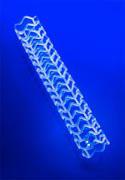
September 23, 2010 - Results from the second stage of a trial studying a bioresorbable vascular scaffold were announced at the Transcatheter Cardiovascular Therapeutics (TCT) meeting in Washington, D.C.
Data from the ABSORB trial, which is testing Abbott’s bioresorbable vascular scaffold (BVS), demonstrated strong results in the same 45-patient group after nine months. When compared to the six-month data, the rate of major adverse cardiac events (MACE) remained unchanged, and there were no reports of blood clots (thromboses).
"I am impressed with how consistent the BVS data have been to date, as the nine-month data are compelling and supportive of earlier positive results," said John Ormiston, M.D., medical director at Mercy Hospital in Auckland, New Zealand, and co-principal investigator for the ABSORB trial. "In addition to the positive safety data we've seen to date, the late loss rate of 0.19 millimeters reported at six months is comparable to a metallic drug-eluting stent, and may address a limitation of metal stents by not leaving metal in the artery. This technology is truly a step forward for the field of interventional cardiology, and I am excited about the prospect of treating patients with this revolutionary product."
Abbott also presented six-month results for all 101 patients enrolled in the second stage of the ABSORB trial. In this complete patient population, the MACE rate remained consistent, with a nominal increase from 4.4 percent at six months in the first 45 patients to 5 percent at six months in all 101 patients. There were no reports of blood clots in any of the 101 patients.
"We are pleased with the progress of ABSORB and the encouraging data we continue to see from the trial in the entire cohort of more than 100 patients," said Patrick W. Serruys, M.D., Ph.D., professor of interventional cardiology at the Thoraxcentre, Erasmus University Hospital, Rotterdam, the Netherlands, and principal investigator for the trial. "The findings to date show that the device appears to effectively treat coronary artery disease with the possibility of restoring natural vessel function in a way that is not possible with permanent implants."
Abbott's BVS is under investigation in two clinical studies, ABSORB and ABSORB EXTEND, and is currently not available for sale anywhere in the world. The BVS is made of polylactide, a biocompatible material that is commonly used in medical implants such as resorbable sutures. It is designed to restore blood flow by opening a clogged vessel and providing support until it is healed. Once the vessel can remain open without the extra support, the scaffold is slowly metabolized and eventually resorbed by the body. Since a permanent implant is not left behind, a vessel treated with a BVS may ultimately have the ability to move, flex and pulsate similar to an untreated vessel.
For more information: www.abbott.com


 January 05, 2026
January 05, 2026 









